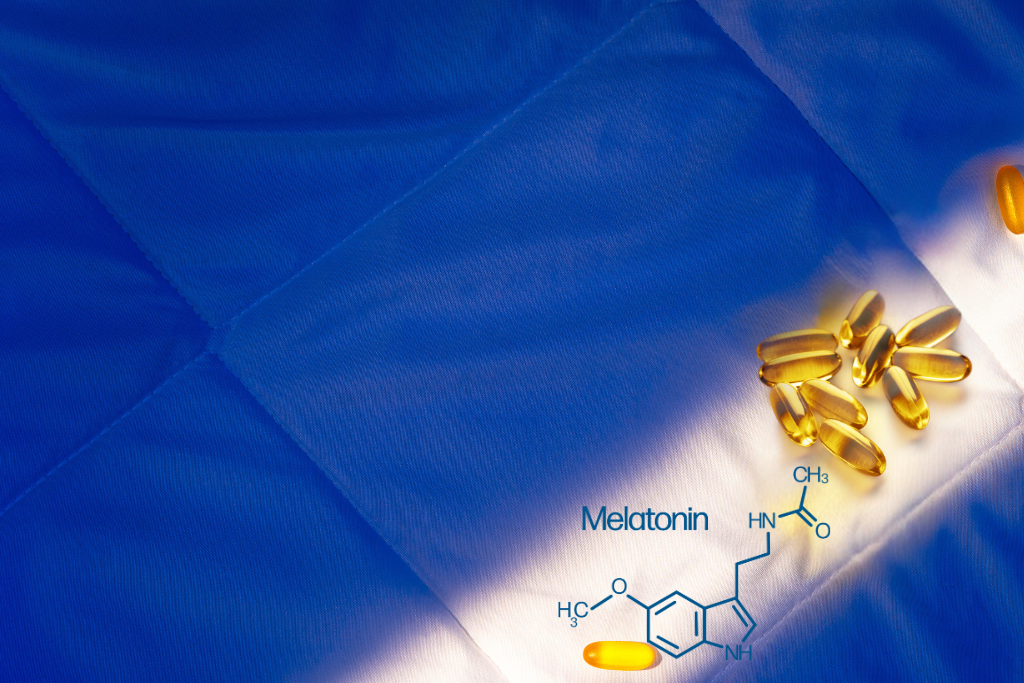
Everything you need to know about melatonin!
10 effects of melatonin
In the evening, we naturally produce melatonin in order to be able to sleep and enable the regeneration of our body during sleep. Melatonin is also produced by different tissues of our body and we have many melatonin receptors, so melatonin is a versatile and vital compound that is essential for a long and healthy life. Let's see what else melatonin is good for besides sleep. We show the 10 most important effects!

1. MELATONIN AND SLEEP
Melatonin levels rise in the body after dark to ensure a restful deep sleep, a refreshed awakening and active, fatigue-free days. The secretion of melatonin is at its peak in childhood, slows down after the age of 20, begins to decrease significantly from the age of 40, and ceases completely in old age. Therefore, as we age, we often face insomnia or sleep disorders.
However, our changed behavior also plays a huge role in the background of the increasing number of sleep disorders. We go to bed late and are surrounded by artificial lights even after dark. The lights of computers, TVs and mobile phones confuse our body's melatonin production, the input of which comes through the retina. Our melatonin level is also affected by our diet and the composition of our intestinal flora. Excessive consumption of sugar and alcohol significantly reduces the body's melatonin levels.
The sleep disorder can be periodic or temporary, such as the loss of sleep-wake balance caused by jet lag or the sleep disorder of shift workers and the resulting feeling of fatigue. Insomnia often accompanies people who suffer from more serious diseases, and melatonin helps in these cases as well.
2. MELATONIN AND AGING
Aging is closely related to the circadian rhythm provided by melatonin, the 24-hour hormonal cycle regulated in our genes, which is a condition for a long and healthy life. Because melatonin slows the aging of the pineal gland, it reduces the aging process of the whole body.
Of course, quality, restful sleep is essential in itself in slowing down the aging process, we use the term "beauty sleep" for a reason. At the same time, we can state that the melatonin level that decreases with age can be considered a sign of aging, which manifests itself in the form of oxidative and inflammatory stress, causing slow and irreversible cell damage.
Research has established that adequate melatonin levels in the body help to prevent many signs of aging, thanks to its strong antioxidant effect, which contributes to the fight against free radicals, inflammation and oxidative stress. Because melatonin receptors are abundantly found in the skin, it protects the skin cells and the skin from premature aging through them.
3. MELATONIN AND THE IMMUNE SYSTEM
In recent decades, melatonin has been reported to perform an important function as an antiviral, antibiotic and anti-parasitic molecule. The latest studies also confirm that melatonin is a strong antioxidant and cell protective agent, which as an immunomodulator helps with under- and over-functioning of the immune system, chronic and acute inflammations. with a reducing and nervous system supporting role.
Melatonin is a compound that communicates between the immune system and endocrine glands, where two-way communication has long been proven and necessary for a long healthy life. Since the level of melatonin decreases with age around the age of 30, and then around the age of 40, the process accelerates further, while approaching the age of 60 it accelerates or ceases significantly, the dietary enrichment of melatonin is a very important act to consider.
COVID-19 AND MELATONIN
According to a recent, comprehensive research from August 2021, melatonin supplementation when administered in the early stages of the COVID-19 infection alleviates the cytokine storms caused by COVID-19, reduces oxidative stress, increases the body's resistance and the chances of survival.
Did you know? The reaction of the immune system with intense inflammation is called a cytokine storm, which can lead to organ failure and eventually the complete collapse of the body.
The disease caused by COVID-19 can cause a cytokine storm in the body, as a result of which, among other things, organ damage, vascular problems, blood clot formation, infarction and thrombosis can occur.
4. CANCER PREVENTION AND MELATONIN
Melatonin may be a promising natural remedy for the prevention or possible treatment of certain hormone-dependent cancers.
However, studies have generally shown that people with various types of cancer have much lower levels of melatonin in their bodies than healthy people.
Research has shown that melatonin inhibits tumor growth and the associated cell division in some types of breast cancer and prostate cancer, as well as in some types of bladder cancer and bone cancer. Another scientific experiment looked at women with breast cancer who had failed chemotherapy drugs. The medication, which proved to be ineffective, was supplemented with melatonin during the treatment, after which 28% of the examined women experienced a decrease in the size of the tumors.
5. OBESITY AND MELATONIN
The relationship between melatonin levels in the body and obesity has been described for more than 20 years. The decrease in melatonin production causes a desire to eat at night, increases the weight and appetite of menopausal women, and generally affects binge eating.
Melatonin has a very close relationship with the hormones ghrelin, which triggers the feeling of hunger, and leptin, which signals the feeling of fullness. If we do not sleep well or if our melatonin production decreases, then ghrelin production increases, if this persists for a long time, insulin resistance appears and then diabetes. While the decrease in leptin level production leads to snacking.
A low level of melatonin increases obesity and can cause metabolic disorders, e.g. insulin resistance. Obesity is a worldwide problem and a serious public health challenge in the 21st century, so research with melatonin continues to prove all the beneficial functions of melatonin in obesity.
6. DIABETES, IR AND MELATONIN
A low level of melatonin has been proven to be a trigger for insulin resistance and type 2 diabetes, because melatonin also appears as a regulator of glucose homeostasis. All of this is also true the other way around: a higher supply of melatonin contributes to the reversal of insulin resistance, with which type 2 diabetes and metabolic syndrome can also be avoided.
Since melatonin receptors are found throughout our body, it is not surprising that they are also found in the islet cells of the insulin-producing pancreas. In this way, melatonin plays a role in glucose metabolism, and this is also confirmed by research. A study examining women with diabetes revealed that when analyzing urine and blood samples, those with lower melatonin production were twice as likely to have type 2 diabetes.
Statistical data have shown that type 2 diabetes is often associated with sleep disorders, and in many cases, disturbed sleep is accompanied by a disturbance in carbohydrate balance. Melatonin plays a leading role in regulating the circadian rhythm, the sleep-wake phase. The quality of sleep of type 2 diabetic patients with sleep disorders significantly improved when taking melatonin, without affecting blood sugar and fat metabolism.
7. DIGESTION AND MELATONIN
Melatonin is found in larger quantities in the digestive system than in the blood, and the digestive system itself also produces melatonin. Melatonin helps bowel movement, reduces inflammation, pain, and has a connection with digestion through the nervous system, and last but not least, with the microbiome.
It has been proven that the health of the digestive system is closely related to the circadian rhythm, and it can be suspected that our unnatural lifestyle, which works against the circadian rhythm, also plays a role in the background of the sudden increase in digestive diseases and complaints. It is interesting that melatonin can shift the balance to the intestinal flora, and this is also true in reverse, the imbalance of the intestinal flora reduces the body's melatonin level.
According to research, melatonin may be a promising preventive/therapeutic approach in inflammatory bowel disease and IBS, several liver diseases, and heartburn and reflux.
8. HEART AND MELATONIN
Based on the available data, it seems that melatonin is a cardioprotective nutrient, i.e. it has properties that protect the heart and vascular system.
Melatonin receptors are found in the heart muscle and blood vessel cells. It helps lower blood pressure, cholesterol and blood fat levels. This is primarily explained by its strong antioxidant and anti-inflammatory properties. Since melatonin is soluble in both water and fat, it can effectively fight free radicals in any environment.
Diseases affecting the heart and vascular system are much more common in people with metabolic diseases such as obesity, metabolic syndrome, insulin resistance, diabetes, where melatonin levels are always reduced compared to people with normal metabolism.
9. BRAIN FUNCTIONS, DEPRESSION AND MELATONIN
Melatonin passes through the blood-brain barrier, its intake increases the level of melatonin in the brain, which clearly affects cognitive functions, reduces neurodegenerative processes, inhibits the destruction of brain cells, and significantly improves cognitive abilities.
According to research, it can help fight Alzheimer's disease and other dementia complaints, complement neuropsychiatric sleep disorders, or provide a solution for the treatment of sleep disorders in autistic children.
Melatonin has been proven to regulate the body's circadian rhythm, thus improving the symptoms of depression caused by the change of season, alleviating the deterioration of mental health caused by stress and improving mood.
10. OTHER ENCOURAGING RESEARCH AND MELATONIN
Melatonin has an influence on the female reproductive organs. works against ovarian aging and infertility. Encouraging research is underway between arthritis and melatonin as a possible adjunctive therapy. Thanks to its strong antioxidant properties, melatonin alleviates the symptoms of tinnitus, can help in the treatment of glaucoma, age-related macular degeneration (AMD) and protect the retina.















